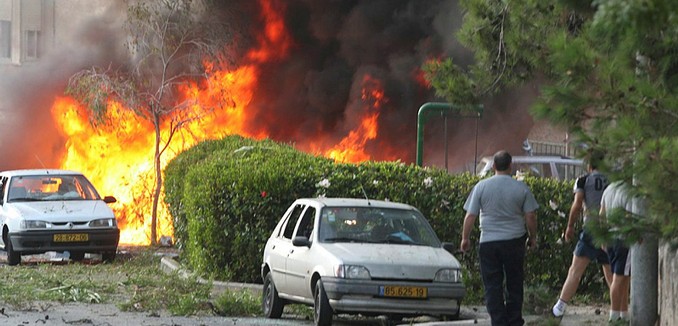A former IDF general warned Israelis on Tuesday that the next war with the Iran-backed Lebanese terror organization Hezbollah would lead to a barrage of rockets into Israel on an order of magnitude higher than anything Israel has yet faced.
Major General (res.) Yitzhak Gershon, who served as the head of the IDF’s Home Front Command during the Second Lebanon War in 2006, told Israel’s Army Radio, that the 2006 war featured up to 160 rockets per day fired at Israel’s north. But given Hezbollah’s military buildup, “we need to expect up to 1,200 rockets in a day – it will be a completely different scenario from anything we’ve known.”
“We will need mental fortitude more than physical protection,” Gershon added.
Hezbollah has an arsenal of more than 130,000 rockets, more than all non-U.S. NATO countries combined, Vanderbilt professor Willy Stern wrote in a recent analysis in The Weekly Standard. This number includes long-range rockets and M-600 ballistic missiles, a single one of which could “wipe out a good chunk of Times Square and maim and kill people four football fields away from the point of impact,” Stern wrote.
Hezbollah also has approximately 100,000 short-range rockets trained on schools, homes, and hospitals in northern Israel that would unleash chaos and potentially kill hundreds of Israeli civilians. Geoff Corn, an international military law expert at the South Texas College of Law, explained to Stern that Israeli faces difficult choices when Hezbollah purposefully places such weaponry in civilian areas. If Israel were to strike in this instance, he concluded, then “both legally and morally, the cause of these tragic consequences will lie solely at the feet of Hezbollah.” Because of this, “Hezbollah should be pressured starting today to avoid locating such vital military assets among civilians.” Otherwise, “the instinctual condemnation of Israel will only encourage continuation of these illicit tactics.”
Israeli military officials detailed to The New York Times last May how Hezbollah has “moved most of its military infrastructure” in and around Shiite villages in southern Lebanon, which “amounts to using the civilians as a human shield.” One official stated that Lebanese civilians are “living in a military compound.”
“We will hit Hezbollah hard, while making every effort to limit civilian casualties as much as we can…We do not intend to stand by helplessly in the face of rocket attacks,” he added.
A few days after the Times report was published, a newspaper linked to Hezbollah confirmed the Israeli assessment. There have been reports of Hezbollah offering reduced-price housing to Shiite families who allowed the terrorist group to hide rocket launchers in their homes.
During a meeting with Hezbollah chief Hassan Nasrallah last August, Iranian Foreign Minister Mohammad Javad Zarif boasted that the nuclear deal presented “a historic opportunity” to confront Israel. Bloomberg News reported earlier this week that Iran has boosted its military budget by 90 percent in the wake of the nuclear deal.
United Nations Security Council Resolution 1701, which was passed unanimously to end the 2006 war between Israel and Hezbollah, forbids the transfer of weaponry to Hezbollah. However, Iran has continued to arm Hezbollah and the Security Council has refused to act to enforce the resolution.
[Photo: Flash90 ]




